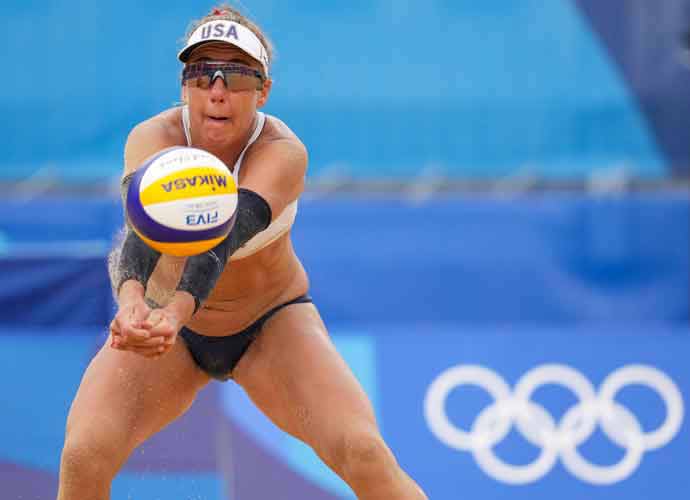VIDEO: U.S. Olympic Beach Volleyball Star April Ross Reveals How She Preps To Win
Olympic beach volleyball star April Ross says that beach volleyball is far more challenging than indoor volleyball because of the lack of coaching throughout the games.
“I think there’s so much difference between beach and indoor [volleyball]. It’s more you have to think for yourself on the beach,” she explained to uInterview exclusively before the London Olympics. “You don’t have a coach on the sidelines yelling at you, telling you what to do, subbing you out if you’re not playing the way he wants you to. If you’re not playing good enough to win, you got to figure it out, you got to figure out how you’re [going to] do something to beat the opponent and you have to touch the ball every other time. If you’re playing [indoors], you can be hidden on the court, like … you don’t have to pass, or you only pass and you don’t have to hit the ball, so … you have to be working on all your skills all the time. It’s two out of three on beach, whereas indoor is three out of five games you have to win so in my opinion, you can make less mistakes.”
Ross, who is currently competing at the Tokyo Olympics beach volleyball, started off playing indoor volleyball. Initially, she didn’t like beach volleyball and the first time she tried it out because she claimed she wasn’t good at it. She said that even though she only likes doing things she’s good at, Ross kept practicing and eventually got the hang of it.
“I played indoor growing up, all through college, and really didn’t like beach volleyball that much, but I started playing professionally indoor and started feeling very beat up,” she said. “My knees broke down on me, my shoulder, I couldn’t swing at the ball anymore. I actually gave up indoor volleyball. I gave up volleyball. I got a hostessing job and was like, ‘Hey, I’m [going to] make a living outside of volleyball.’ I actually enjoyed it, but then my teammate from USC … called me up and said. ‘Hey, come out and play on the beach with me. Just try it, see if you like it.’ I said, ‘Okay, why not?’ I went out, I was terrible and I don’t know why I liked it, because I usually only like things that I’m good at, but I think it was just being out on the beach and the culture, it was a ton of fun and I stuck with it and finally got better and better, so it was just kind of a matter of fate. It wasn’t a decision I made where I’m like, ‘Ok, I think I’m [going to] be good at beach, I’m [going to] try it.’ Even though people have said it to me all my life, like, ‘You need to play beach,’ I’m like, ‘I don’t really like it.’ It was just random act of fate and here I am, so [it has] worked out.”
Ross said her method for winning competitions is to watch videos of opponents playing.
“Well, we have our coach, who, before each match, watches video of our opponent and draws out a scouting report, shows us their tendencies, writes down what he thinks we should do against the team, but Jen and I have our own opinions and so we take that and then we kind of talk amongst ourselves and talk about what we feel comfortable doing against the other team, so it’s kind of a collaboration. We’ll start with that, but we’re not opposed to changing in the middle of a match, so if it’s not working we call a timeout. Jen and I talked about what we might try to do different. So it’s just always a work in progress, but it starts, I’d say, with our coach and his notes.”
In 2009, Ross said her team set a goal to be qualified for the 2012 Olympics; they looked for effective ways to train and tried to eat as healthy as possible.
“I think for four years not, since 2009, where we really set a goal for ourselves to make the 2012 Olympics, we looked at everything we did as far as how we practiced, how we trained and one of the big things is how we eat and we changed our diet a lot, cut out a lot of carbs, cut out a lot of sugars, started eating more natural, more organic, just as healthy and clean as possible. Salads and vegetables and lean meats all are fair game. We still like to live and have good food so once a week we’ll go out to a big dinner and have something really yummy to eat.
Though she doesn’t have any morning rituals, Ross said she likes to relax for at least 45 minutes in the mornings.
“I don’t really have a morning ritual. I have what I like to eat, but that’s more based on performance and how I feel after I eat it. Jen and I like to have some time to sit at breakfast. We like to have at least 45 minutes where we can drink our coffee and kind of relax and we try not to rush because when you’re rushing at breakfast you’re just [going to] end up rushing the rest of the day. I guess if there’s one thing, it’s just to take our time and enjoy a little bit of time in the morning.”
Ross said that missing the 2008 Olympics made her cherish the competition more and motivated her to make it to the 2012 Olympics.
“Missing out on 2008 really created a determination in me and gave me a ton of motivation to make the 2012 Olympics and I think maybe made it seem more valuable. Like, I saw how easily it can slip away and I think it’s helped me relish every moment since we qualified, like, ‘I’m just [going to] make the most of this and have a ton of fun and do my best.”
RELATED ARTICLES
Get the most-revealing celebrity conversations with the uInterview podcast!









Leave a comment